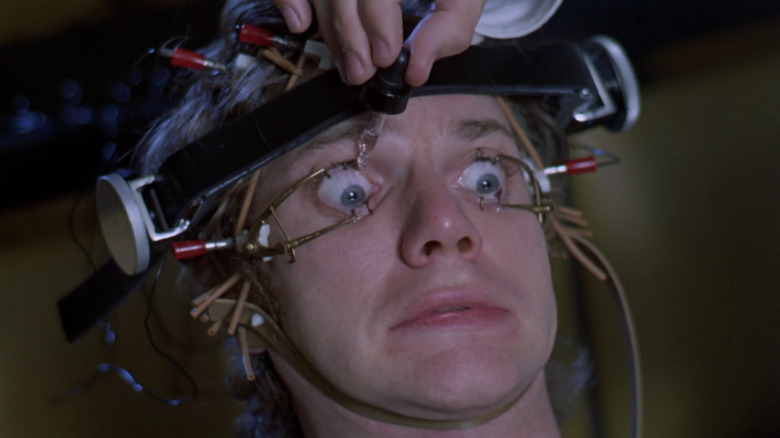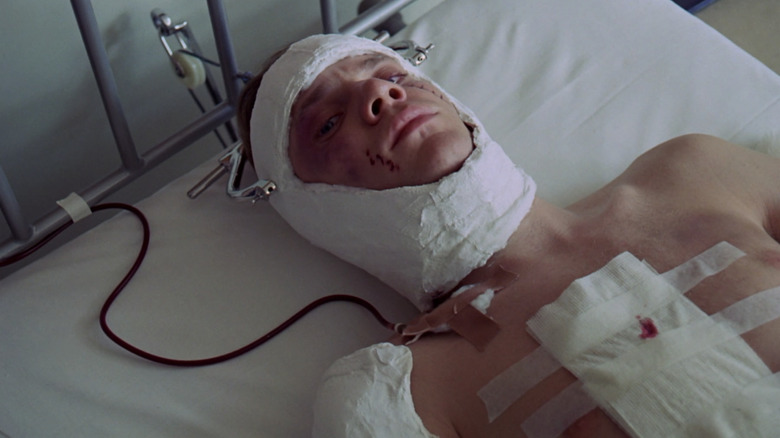Why A Clockwork Orange Couldn't Be Seen In U.K. Cinemas For Over 25 Years
Recently, we examined the controversy behind "A Clockwork Orange," a film that went largely unseen by a whole generation of British filmgoers as it was withdrawn from circulation in the U.K. for over a quarter-century. What's surprising is that this came about as a result of a request that director Stanley Kubrick himself made to Warner Bros.
One of the most famous images from "A Clockwork Orange" is that of Malcolm McDowell's character, Alex DeLarge, sitting with his head harnessed and his eyes pinned open as white lab coats subject him to the Ludovico technique, a form of aversion therapy meant to brainwash and reform dangerous criminals. It's a nightmare vision of totalitarianism, the government "controlling its citizens," as McDowell put it in a 40th-anniversary retrospective (via The Guardian). Yet it functions simultaneously as a kind of twisted karma, a comeuppance for Alex, who we've seen perpetrating ultra-violent acts of murder and sexual assault on random strangers. A hand reaches in and applies eyedrops as he is forced to watch scenes of bloodshed, gang-rape, and swastikas onscreen.
Moviegoers in Britain stared up at the screen unharnessed, watching "A Clockwork Orange" uncut, in December 1971 when the film first premiered. Within a few years, however, there would be an inversion of what happened to Alex. Instead of being forced to watch something, audiences would be unable to legally see it anywhere in the country.
Rather than the government instigating this, it was Kubrick, the artist, apparently exerting control over his own film to keep it from being further misinterpreted and linked to ongoing headlines. In 1972 and 1973, "A Clockwork Orange" came up in two court cases against real-life teenage boys accused of manslaughter and murder in England. The second one involved the killing of a homeless man. The 16-year-old convicted of the crime told the authorities that he had heard about the scene in "A Clockwork Orange" where Alex and his droogs attack a homeless man.
Death Threats and Resentment
"A Clockwork Orange" is based on an Anthony Burgess novel, and as the AFI Catalog notes, "other violent criminals used the book and film as part of their defense in the British criminal courts" following the movie's release. The media was all over this, and Far Out Magazine observes that Kubrick struggled because he made his home in Britain and was facing "constant abuse from the tabloid press." Though he never delineated his exact motives for withdrawing "A Clockwork Orange" from circulation there, he likened the media furor surrounding it to "the Salem witch trials," and it seems likely this was a factor in his decision.
In 2011, when the director's widow, Christiane Kubrick, appeared with McDowell at the Cannes Film Festival in that 40th-anniversary retrospective, they revealed that Kubrick's family had even received death threats due to "A Clockwork Orange." There were "nasty phone calls" and "horrible letters" and they had people outside their front gate.
Christiane was also quoted in the book "The Complete Kubrick," saying, "Stanley was very insulted by the reaction, and hurt." Evidently, he resented the implication that his film could push someone over the edge or act as the catalyst for violent crimes in the real world.
There are no direct quotes from Kubrick explaining why he endorsed taking the film out of circulation, but in the book, he told a journalist, "The people who commit violent crime are not ordinary people who are transformed into vicious thugs by the wrong diet of films or TV. Rather, it is a fact that violent crime is invariably committed by people with a long record of anti-social behavior."
This opens up a separate debate about art and its potential influence on crime, which has continued into the present day with films like "Joker," which inspired a train attack in Tokyo in 2021 while "A Clockwork Orange" was gearing up for its 50th anniversary. There are no easy answers, but Kubrick was so adamant in his decision about "A Clockwork Orange" that he did not allow the film to be seen again in the U.K. until just before he died in 1999.

